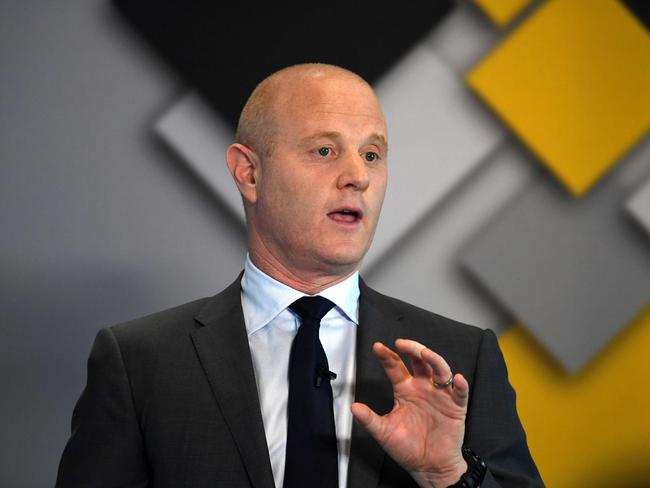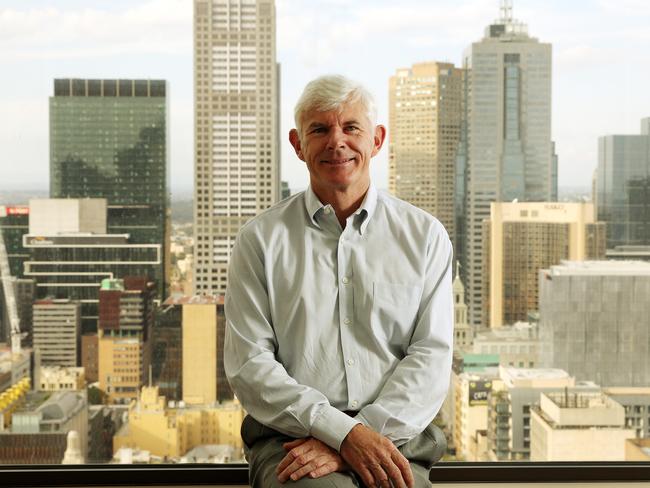Terry McCrann: CBA states its case, but faces more pain
AT least give the CBA its due. Certainly, hold it to account; and it will be so held, expensively, in spades. But also, have a sense of proportion. And reality, writes Terry McCrann.
Business
Don't miss out on the headlines from Business. Followed categories will be added to My News.
AT least give the CBA its due. Certainly, hold it to account; and it will be so held, expensively, in spades. But also, have a sense of proportion. And reality. Plus, there was a disturbing new element in its ‘world of money-laundering pain’.
CBA ADMITS ANTI-MONEY-LAUNDERING BREACHES
COMMONWEALTH BANK CHIEF ADMITS BANK MADE MISTAKES
CBA’s statement on Wednesday night had an at least unwelcome and potentially ominous reference to “additional alleged (money laundering) contraventions” from Austrac.
That’s on top of the near-54,000 existing alleged contraventions. These are likely to be of the more serious ‘suspicious matter reports’ (SMRs) rather than the (still, important) reporting failure of the ‘threshold transaction reports’ (TTRs).
The TTRs were of course where CBA was ‘too clever by half’ in allowing $20,000 cash deposits into its ATMs and then being ‘not too smart’ in not bothering to check whether, well, people were making such $20,000 deposits.

Some 53,000-plus such deposits and some 53,000-plus CBA failures to lodge TTRs later and it all blew up in CBA’s board and executive management’s collective face; and that of the wider banking community, becoming the final straw that forced the royal commission. Now, we will have to see how many more and how qualitatively serious are these ‘additional contravention allegations.’ The concern is that they go deeper into what might be termed ‘real’ money laundering.
CBA can try to argue the TTR failures were essentially the one failure: it had one computer glitch and the computer kept, well, glitching. While I don’t buy that in penalty terms; I would certainly accept that CBA has a very valid argument in terms of the substantive failure — that the near 54,000 supposed ‘money laundering’ figure completely, utterly misleadingly, and indeed unfairly, overstates CBA’s ‘crime’.
As it points out, even the 53,000 plus TTR fails were just 2.3 per cent of all the TTRs it did lodge (presumably relating to over-the-counter deposits).
If you collapse that 53,000 plus number into essentially one (very big) mistake and add it to the (more serious) SMRs, CBA could be said to have had only between 143 fails (its claim) over a three-year period and billions of actual transactions, and 245 (Austrac’s total, some of which CBA denies). Plus the unknown ’new ones’.
In the current frenzy, it’s not going to get much airplay; but for heaven’s sake, can we have a bit of proportion? This is not evidence of some vast money laundering-facilitating bank that should be operating out of the Bahamas? Or even of massive incompetence?
Also, can we have a bit of reality? CBA is a very large bank, every one of its staff can’t be perfect. But it has to pay the penalty for them not being so.
BRIAN’S BLOOD-BANK BREAK-BACK
SO, is Brian McNamee’s ascension to the chairmanship of the great business he built the exception that proves the rule or defies it?
That’s the ‘rule’ that a company’s CEO should not subsequently become its chairman as that runs the risk of crimping the CEO or, worse, has the chairman playing the role of CEO-in-chief.
Now, I put the word rule in quotation marks as it’s certainly not a formal one, far less a legal one in Australia; and in any event, although relatively rare, it does happen — mostly not via an immediate move from the CEO’s office straight into the chairman’s.
That would, unambiguously, be a very bad move. In the worst case it likely stops the ‘buried bodies’ being discovered and exhumed.
McNamee retired as CSL CEO in 2013, his successor Paul Perreault has had four years to stamp his authority and both his operational and strategic leadership on the company.

Coming in, he faced a tough ‘ask’. He was following one of the great ‘hero CEOs’ in McNamee — arguably, in the local context, the Muhammad Ali of hero CEOs.
He’s not only proved a success, but has arguably shown himself to have been exactly the right person to build on what McNamee had created.
Now as a general principle, I would argue it’s best that, once a CEO retires from a company, he or she should retire from that company permanently; both in the company’s best interests and that also of the retiring CEO who, good bad or indifferent, can and should ‘move on’.
This is the case whether the ex-CEO is succeeded by an insider, who would be constrained about ‘betraying’ their former mentor and now chairman, by upturning ‘their’ company or seeking to take it in a different direction.
Or if succeeded by an outsider, who could feel ‘trapped’ between the former CEO’s command of the boardroom and that CEO’s former colleagues in management.
CEOs moving ‘out and on’ and staying ‘out’ has mostly been the practice; although we’ve seen a few CEOs returning as chairman after some sort of break.
In the case of Wesfarmers its former ‘hero CEO’ Michael Chaney came back as chairman 10 years after leaving. Further, in Chaney’s case he came back right towards the end of his own successor’s term, as CEO, in time to pick his successor’s successor.
In the case of McNamee and CSL, the strongest case for his return is that, while he and Perreault are both very much on the same page, they also are more complementary, across a range of attributes, than mirror images.
This would suggest that just as Perreault proved exactly the CEO to succeed McNamee, now McNamee can be exactly the chairman to support Perreault, maximising both his and CSL’s performance. Let’s hope that proves true.



